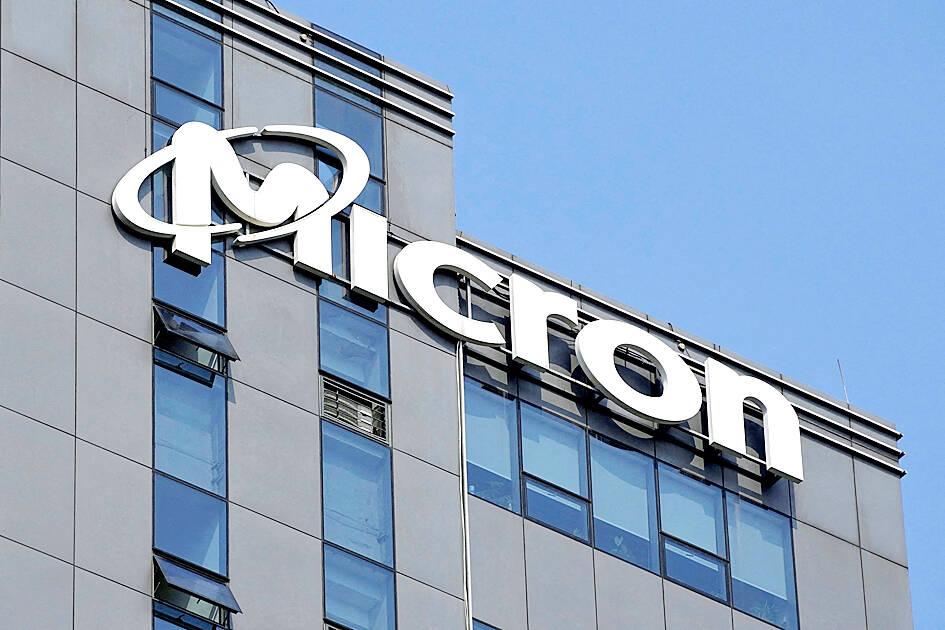Micron Technology Inc, the largest US maker of computer memory chips, is on track for its shares to rise by the most in six months after announcing surprisingly strong sales and profit forecasts, helped by demand for artificial intelligence (AI) products.
Fiscal first-quarter revenue would be about US$8.7 billion, the company said in a statement on Wednesday. That compares with an average analyst estimate of US$8.32 billion. Profit would be about US$1.74 a share, higher than a projection of US$1.52.
The rosy outlook is the latest sign that Micron is benefiting from a boom in AI spending. Orders for high-bandwidth memory have added a lucrative new revenue stream for the company and other chipmakers. The technology helps to develop AI systems by providing more rapid access to massive pools of information.

Photo: Reuters
Demand has been outpacing supply, allowing Micron to boost prices and secure long-term guaranteed contracts. It has already sold out of the product for this year and next year, the company said on Wednesday.
Micron shares rose by about 15 percent to US$110.60 in premarket trading on Thursday. If the gains hold, it would be the biggest intraday increase since March 21.
Results from Micron’s fiscal fourth quarter also handily beat estimates. Revenue increased by 93 percent year-on-year to US$7.75 billion for the period that ended Aug. 29. Excluding certain items, profit was US$1.18 per share. On average, analysts had estimated a profit of US$1.12 per share and revenue of US$7.66 billion.
Micron has an edge because it is the first chipmaker to reliably offer more advanced memory in high volumes, executive vice president of operations Manish Bhatia said in an interview.
With companies racing to beef up their AI software and hardware — and using more memory in the process — Micron is in a good position, he said.
The chipmaker is also emerging from a slowdown in demand for PCs and smartphones, two of the biggest markets for memory chips. Device shipments are now growing again. Those devices would increasingly feature AI functionality that requires more memory chips to work properly, adding a further benefit, Bhatia said.
Micron makes DRAM, a type of chip that temporarily holds information and works alongside processors from companies such as Nvidia Corp and Intel Corp. It also makes nand flash memory — semiconductors that store information in everything ranging from data-center computers to smartphones. The company competes with South Korea’s Samsung Electronics Co and SK Hynix Inc in the memory market.
“Robust AI demand drove a strong ramp of our data center DRAM products,” Micron chief executive officer Sanjay Mehrotra said in the statement.
“We are entering fiscal 2025 with the best competitive positioning in Micron’s history,” he said.

Taiwan Semiconductor Manufacturing Co (TSMC, 台積電) yesterday said that its investment plan in Arizona is going according to schedule, following a local media report claiming that the company is planning to break ground on its third wafer fab in the US in June. In a statement, TSMC said it does not comment on market speculation, but that its investments in Arizona are proceeding well. TSMC is investing more than US$65 billion in Arizona to build three advanced wafer fabs. The first one has started production using the 4-nanometer (nm) process, while the second one would start mass production using the

When an apartment comes up for rent in Germany’s big cities, hundreds of prospective tenants often queue down the street to view it, but the acute shortage of affordable housing is getting scant attention ahead of today’s snap general election. “Housing is one of the main problems for people, but nobody talks about it, nobody takes it seriously,” said Andreas Ibel, president of Build Europe, an association representing housing developers. Migration and the sluggish economy top the list of voters’ concerns, but analysts say housing policy fails to break through as returns on investment take time to register, making the

‘SILVER LINING’: Although the news caused TSMC to fall on the local market, an analyst said that as tariffs are not set to go into effect until April, there is still time for negotiations US President Donald Trump on Tuesday said that he would likely impose tariffs on semiconductor, automobile and pharmaceutical imports of about 25 percent, with an announcement coming as soon as April 2 in a move that would represent a dramatic widening of the US leader’s trade war. “I probably will tell you that on April 2, but it’ll be in the neighborhood of 25 percent,” Trump told reporters at his Mar-a-Lago club when asked about his plan for auto tariffs. Asked about similar levies on pharmaceutical drugs and semiconductors, the president said that “it’ll be 25 percent and higher, and it’ll

CHIP BOOM: Revenue for the semiconductor industry is set to reach US$1 trillion by 2032, opening up opportunities for the chip pacakging and testing company, it said ASE Technology Holding Co (日月光投控), the world’s largest provider of outsourced semiconductor assembly and test (OSAT) services, yesterday launched a new advanced manufacturing facility in Penang, Malaysia, aiming to meet growing demand for emerging technologies such as generative artificial intelligence (AI) applications. The US$300 million facility is a critical step in expanding ASE’s global footprint, offering an alternative for customers from the US, Europe, Japan, South Korea and China to assemble and test chips outside of Taiwan amid efforts to diversify supply chains. The plant, the company’s fifth in Malaysia, is part of a strategic expansion plan that would more than triple